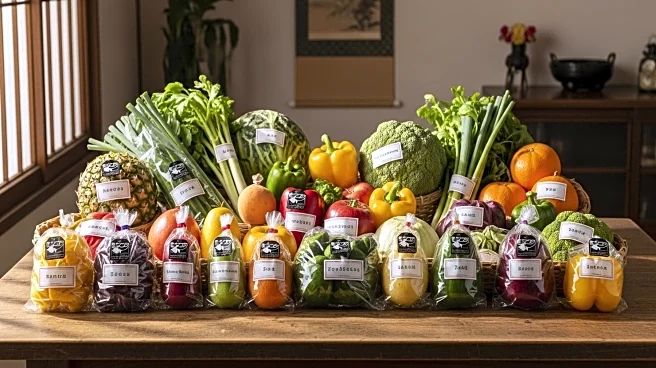What's Happening?
Japan's Agriculture Ministry has announced a new initiative to introduce multilingual food labels, aimed at making food products more accessible to foreign tourists. This project, set to begin as a trial in 2026, will initially include English translations alongside traditional Japanese labels, with plans to expand to other languages. The initiative addresses the language barrier that has often left international visitors unclear about food ingredients, thus complicating their shopping experience in Japan. By providing multilingual ingredient lists, the ministry aims to enhance transparency and assist tourists, especially those with dietary restrictions, in understanding the products they purchase. This move is also expected to streamline processes for Japanese food companies by reducing the need for multiple product labels for domestic and export markets.
Why It's Important?
The introduction of multilingual food labels is significant as it enhances the experience of international visitors in Japan, making it easier for them to navigate grocery stores and understand food ingredients. This initiative not only benefits tourists but also presents an opportunity for Japanese food companies to expand their global reach. By simplifying labeling requirements, companies can reduce production costs and target a wider audience, particularly in English-speaking markets. Additionally, the initiative supports consumers with special dietary needs by providing clear information on allergens and dietary suitability, such as gluten-free or halal options. This could lead to increased acceptance and sales of Japanese food products both domestically and internationally.
What's Next?
The Agriculture Ministry plans to launch a pilot project in 2026, focusing on non-perishable foods like matcha tea snacks and dried noodles. This trial phase will evaluate the effectiveness of the new labels and gather feedback from consumers and manufacturers. If successful, the initiative could expand to include a broader range of food products. The ministry also aims to ensure that these labels comply with international regulations, facilitating easier export of Japanese food products. This could open new markets for Japanese companies and further integrate Japan's food industry into the global market.
Beyond the Headlines
The initiative could have long-term cultural and economic impacts by promoting Japanese food products globally and fostering a more inclusive market. By bridging language gaps, it enhances cultural exchange and understanding. Additionally, aligning with international labeling standards could position Japan as a leader in global food safety and transparency, potentially influencing other countries to adopt similar practices.











